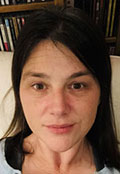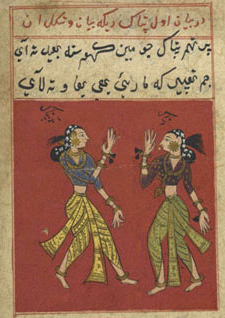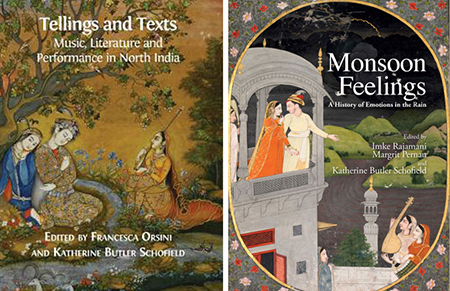Workshop on 'Doing History' in Pakistan
Mon, Mar 7: 5 PM-6:30 PM. Venue: G&T Auditorium, Main Campus.
Keynote Speaker (via Zoom)
Dr Katherine Butler Schofield
Senior Lecturer in South Asian Music and History, King's College London
Archives Differing: Stereophonic Methods, Auditory History, and the Paracolonial Indian Ocean c. 1760–1860

One of the biggest methodological challenges in writing the history of paracolonial soundworlds before the era of recorded sound is developing an ear for where sound might linger within and across radically differing archives. This challenge is compounded when one is seeking to connect archives that are multilingual, embodying multiple lineages of knowledge, and interregional, in this case dealing with the diverse cultural geographies of the eastern Indian Ocean c.1750–1900. The texture of the official colonial records of, say, the India Office in London is utterly distinct from those of the hundreds of rich treatises on Hindustani music from this era in South Asia’s classical and vernacular languages, which themselves embody diverse genealogies of musical thought. But in the Malay world for the same period, under the same colonial rulers, there were no written works dedicated to music at all; instead, one must trawl the entire gamut of Malay and other regional literatures for sonic references, and think laterally about how to trace audibility and performativity in language itself.
How can we use these differing colonial and paracolonial archives, and the idiosyncratic methods required to mine each one, to write cohesive, connected histories of music and sound in the eastern Indian Ocean—especially when the ephemeral object of our attention has long passed into silence? In this paper I will document the challenges and advantages of bringing variegated archives together—from both sides of the Bay of Bengal, and from colonial records and private papers to the manuscript and print cultures of the colonised—to produce an unprecedentedly stereophonic understanding of Indian Ocean soundworlds in the late eighteenth and early nineteenth centuries. In so doing I aim to present one solution to the question of how we write histories of music and sound that take ethnomusicological syncretic method seriously.


Katherine Butler Schofield is a historian of music and listening in Mughal South Asia and the paracolonial Indian Ocean, and a Senior Lecturer at King's College London. Her new monograph Music and Musicians in Late Mughal India: Histories of the Ephemeral, 1748–1858 will be published in 2022 by Cambridge University Press. This book grew out her 2018 British Academy Mid-Career Fellowship presenting a series of public lectures and conversations at the British Library, and a set of podcasts, Histories of the Ephemeral: Writing on Music in Late Mughal India available via Soundcloud https://soundcloud.com/user-513302522. Dr Schofield's first book, an edited volume with Francesca Orsini, Tellings and Texts: Music, Literature, and Performance in North India, was published in 2015 by Open Book Press. Her second book, Monsoon Feelings: A History of Emotions in the Rain, edited with Imke Rajamani and Margrit Pernau, was published by Niyogi Books in 2018.
In 2011–16 she was Principal Investigator of a €1.18M European Research Council grant, "Musical Transitions to European Colonialism in the Eastern Indian Ocean", which examined the history of transitions from pre-colonial to colonial musical fields in India and the Malay world c. 1750-1900 through multilingual, intermedial, and stereophonic research methods. Dr Schofield continues to curate the SHAMSA database funded through this grant, which describes well over 300 major written sources c. 1700–1900 for the history and analysis of Hindustani music and dance in Mughal and British-colonial South Asia. The SHAMSA digital collection already constitutes the largest single repository of primary written sources on Indian music and dance in the world, and is available here: https://zenodo.org/record/1445775

Dr Schofield originally trained as a viola player, before embarking on her doctoral work at SOAS University of London in the cultural history of Hindustani music, followed by a research fellowship at Corpus Christi College, Cambridge, and a lectureship at Leeds. Her research interests lie generally in the areas of South Asian music, the history of Mughal South Asia (1526-1858), Islam, empire, and the intersecting histories of the emotions, the senses, aesthetics, ethics, and the supernatural. Working largely with Persian, and latterly Urdu, sources for Hindustani music c.1570-1860, in recent work she has established music as central to Mughal technologies of sovereignty and selfhood, identified classicisation processes at work in early-modern South Asian arts, located the relationship of ragamala paintings to their melodic inspirations in shared notions of power, told tales about ill-fated courtesans and legendary ustads, and traced the lineage of the chief musicians to the Mughal emperors from Akbar to Bahadur Shah Zafar.
Most recently Dr Schofield has turned her attention to advocacy for Aghanistan's musicians, whose livelihoods and exquisite musical heritage are under severe threat from the Taliban. She is external lead for the International Campaign For Afghanistan's Musicians; you can find out more from their website: https://www.icfam.info